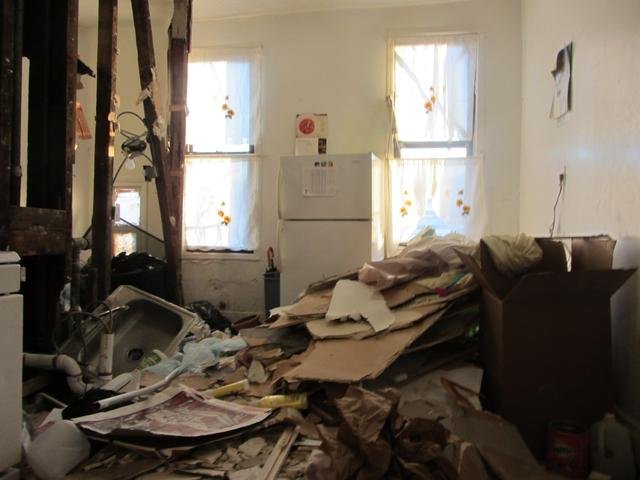Landlord Threatening To Let Buildings Fall Apart Can't Actually Do That
July 12, 2019, 10:11 a.m.
'Repairs, something landlords always have to do, are part of the warranty of habitability. You have to provide good working appliances, fix windows, and have to provide clean living conditions.'

Don't let this happen to your apartment, capisce?
The Friday after Independence Day, a landlord named Marc Goldstein published an opinion piece in the Daily News that immediately attracted attention in all corners of New York’s housing world.
“I thought of it as a social compact,” Goldstein wrote. “New York City rent-stabilized apartment building owners would endure being the most regulated business south of the banking industry. And the regulators, the politicians, would regulate only where necessary.”
“I was wrong.”
Goldstein, the owner and manager of 400 rent-stabilized apartments in Brooklyn, argued the strengthened rent laws passed to much fanfare in Albany last month would mean he could no longer pay to properly maintain his buildings.
Goldstein said two particular changes—harder caps on how high landlords can raise rents after performing upgrades in individual apartments and entire buildings—would lead to him no longer take the “financial risk” of replacing windows, boilers, or elevators. “With fewer employees on the payroll, the floors will be dirtier. Windows will remain broken a tad longer. Apartment repairs will take longer to perform.”
Can landlords like Goldstein actually drag their feet like this? Is what he described legal?
Andrea Shapiro, program manager and member organizer with the Metropolitan Council on Housing, cautioned that Goldstein seemed to be conflating the limits on rent hikes associated with individual capital improvements (IAI’s) and major capital improvements (MCI’s) with an apartment’s requirement for a “warranty of habitability.”
The warranty of habitability, a bedrock of New York City tenant law, requires that tenants have a “right to [a] livable, safe, and sanitary apartment, a right that is implied in every written or oral residential lease,” according to the New York Attorney General’s tenant guide. The warranty covers not just individual apartments, but also the public areas of buildings.
“Repairs, something landlords always have to do, are part of the warranty of habitability," said Shapiro. "You have to provide good working appliances, fix windows, and have to provide clean living conditions. You need to keep public spaces clean.” Landlords can only earn windfall profits from replacing a broken fridge, she says, "if tenants don’t understand their rights.”
Contacted by Gothamist, Goldstein said that though it didn't make it into his op-ed, he's well aware of the warranty of habitability: "I will keep complying with the law, keep following the law and keep buildings habitable in a legal manner." However, he added that "the new laws encourage minimal compliance at best. This equals substandard housing. I'm afraid most rent stabilized housing will eventually be no better than public housing. The tenant advocates got their low-rent guarantees. But at a cost to quality."
Tenant advocates long saw MCIs and IAIs as ripe for abuse, with landlords winning permanent rent increases through either unnecessary work or outright fraud. Landlords maintained the increases were necessary to maintain rent-stabilized apartments, especially as other associated costs with running buildings rise over time.
"In the back of mind if I'm paying increases in taxes, water, and sewer, how am I going to pay increased costs?" Goldstein told Gothamist. "They advocated so hard and so successfully, the resulting laws are going to hurt tenants. So brainless."
Initially, tenant activists and progressive Democrats in Albany wanted to abolish MCIs and IAIs altogether. After pushback from the real estate industry and Governor Andrew Cuomo, a compromise was brokered: Instead of being able to hike rents up to 6 percent annually for these building upgrades, building owners would have these increases capped at 2 percent a year. (MCI- and IAI-related increases also now expire after 30 years; they were permanent under the old law.)
Michael McKee, a longtime tenant activist and treasurer of TenantsPAC, agreed with Shapiro about the warranty of habitability, and maintained that what Goldstein described would also be in violation of city housing maintenance code.
“It’s the code adopted by the city which governs things landlords must do in dwellings with three or more units,” McKee said. “Exterior lighting, heat, and hot water, all the things landlords are required to provide.”
The bad news for tenants? The new rent laws won’t change the same hassle tenants have to go through to challenge unscrupulous landlords, McKee said. If a landlord is violating the warranty of habitability or maintenance code, a tenant can’t simply wait for the city or state to swoop in to enforce the law. Court action, inevitably, is necessary.
McKee said a tenant’s best bet is filing a housing part action, which allows a tenant to sue a landlord to make repairs. A lawyer isn’t required.
Both Shapiro and McKee argued that Goldstein is merely greedy, because landlords already turn healthy profits in the New York real estate market. And Goldstein himself may not be hurting too much more with stronger rent laws for another reason: His buildings already collect substantial tax breaks from the state.
Since 2015, Goldstein has received more than $1.5 million in tax breaks on over $3 million in property taxes, a deduction of more than 50 percent, according to an analysis performed by Housing Rights Initiative, a nonprofit housing watchdog group. Many of these tax breaks were collected through the lucrative J-51 program, a favorite of landlords and developers.
Aaron Carr, the executive director of HRI, called Goldstein a “terrible spokesperson” for real estate.
“Should Mr. Goldstein follow through on his implied threat and let his buildings fall into disrepair, we will petition the city to revoke every single one of his tax breaks and affix his op-ed to a complaint that we will file with the Attorney General’s office,” Carr said.